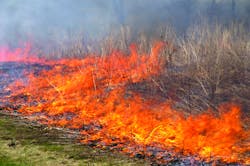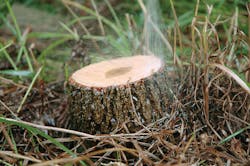Everyone has seen the devastation wildfires can cause. Buildings and homes often are decimated; evacuation routes are flooded with families in cars; and countless acres of land are ravaged in a matter of hours or days. Avoiding these unfortunate results can be challenging, but utility vegetation management programs can play an integral role in minimizing their occurrences and severity.
According to the California Department of Forestry and Fire Prevention, one in every 10 wildfires are caused by electricity. Statistically speaking, that means electric power was responsible for nearly 7000 of the 68,988 wildfires reported by the Congressional Research Service in 2022.
From dry conditions and high temperatures to rough terrain and varying densities of incompatible plant species, vegetation managers face numerous challenges as they work to prevent trees and other woody plants from causing wildfires and lapses in electrical service. Fortunately, utility vegetation managers can use the following strategies to prevent trees and other incompatible plant species from impacting utility infrastructure, which significantly enhances electrical transmission reliability and wildfire mitigation efforts as well as a utility’s public image.
1. Conduct Regular Inspections
Optimizing resource management is essential for vegetation management programs, as resources often are expected to do more with less. By regularly inspecting managed land for areas where problematic trees and other incompatible plants pose the greatest threat to utility infrastructure, vegetation managers can effectively prioritize the control and removal of vegetation that either poses a wildfire risk or threat to electrical transmission reliability.
In addition to inspecting vegetation throughout and adjacent to utility right-of-way (ROW) corridors, the following inspections can help to prevent utility pole failures and wildfire ignitions caused by inadvertent sparks:
- Check guy wire poles for wood decay or deterioration.
- Ensure security of guy wires and anchoring systems.
- Confirm bare-ground results around the base of each pole.
2. Effectively Control Incompatible Vegetation
Environmental research studies have shown the exclusive use of mechanical control methods, such as mechanized mowing, generally is ineffective at providing long-term control of incompatible trees and other problematic plant species throughout the wire zone and border zone of utility ROW.
- Basal bark, basal cut-stump or dormant-stem treatments
- Grass-friendly brush mixes
- Hack-and-squirt treatments
- Cut-stubble treatments.
These impactful strategies can be used to support the development of desirable grasses and forbs that impede the development of incompatible trees and flammable non-native plant communities. Doing so ensures vegetation management programs successfully meet the power line clearance requirements established by their state while limiting potential fuel sources for wildfires. Moreover, supporting the release of beneficial grasses and forbs can help vegetation managers to establish fuel breaks throughout utility ROW, which provide safer environments for firefighters to combat the flames.
3. Remove Remaining Debris
Mechanical control methods can provide short-term relief to safeguard the integrity of utility infrastructure, and herbicide treatments can help to prevent the reestablishment of incompatible vegetation in the future. However, any debris that remains after these treatments can still provide ample fuel for a wildfire. Utility foresters and vegetation managers can use the following strategies to ensure these fire hazards are effectively removed or repurposed:
Bale woody biomass for proper off-site disposal.
Cut trees into lengths that can be sold to local mills.
Use chippers to break down debris and broadcast to sloped areas for erosion control.
4. Prioritize Communication
Public and private land often runs adjacent to utility ROW, making the use of effective vegetation control strategies on those sites equally important. While utility vegetation managers can collaborate with a variety of public and private entities to improve fuel load reduction and tree removal strategies in these areas, ensuring landowners and other land entities approve of each applied strategy is essential.
Vegetation managers often are the unsung heroes for utilities, and their impact reaches far beyond the edges of utility ROW. Their work not only enhances electrical transmission reliability and wildfire mitigation efforts but also a utility’s public image. Effective vegetation control strategies can be used to ensure these positive outcomes; it is simply a matter of applying them in the right place at the right time. To learn more about best practices for managing incompatible vegetation throughout utility ROW and adjacent lands, visit Utility.VegetationMgmt.com.
Jerome Otto ([email protected]) is a market development specialist with Corteva Agriscience. Otto uses more than 36 years of experience with agricultural solutions to support vegetation management specialists while serving as the interface between commercial sales and R&D for Corteva. He is based in Scottsbluff, Nebraska.
About the Author
Jerome Otto
Jerome Otto is a graduate of the University of Minnesota, and holds degrees in agricultural economics and animal science. Since 1987, he has held a variety of sales positions with Dow, now Corteva Agriscience. Jerome is a market development specialist for Corteva, serving the range, pasture, and land management markets in the western United States.


